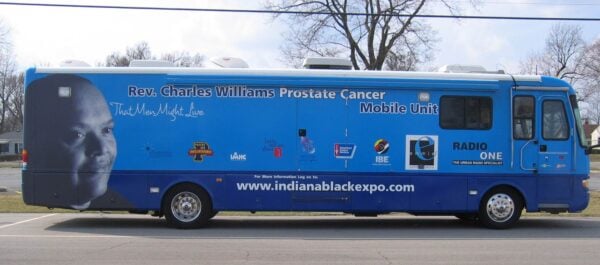Indianapolis is facing a growing public health challenge as prostate cancer cases rise, reversing decades of decline.
A recent report from the American Cancer Society (ACS) shows prostate cancer incidence increased by 3% per year from 2014 to 2021. Advanced-stage diagnoses rose even faster, between 4.6% and 4.8% annually, after years of steady decreases.
“Our research highlighting the continued increases in prostate cancer incidence and persistent racial disparities underscores the need for redoubled efforts to understand the etiology of prostate cancer and optimize early detection,” said Tyler Kratzer, ACS associate scientist in cancer surveillance research.

Nationwide, ACS estimates there will be 313,780 new prostate cancer cases and 35,770 deaths in 2025.
In Indiana, 4,084 new invasive prostate cancer cases and 643 deaths were recorded in 2019, according to the Indiana Department of Health’s Prostate Cancer Fact Sheet. Between 2015 and 2019, the state averaged about 4,002 new cases annually, with an incidence rate of 90 per 100,000 males and a death rate of 14.6 per 100,000. The report also found that African American men in Indiana faced a significantly higher risk, with an incidence rate of 146.6 per 100,000 compared to 85.3 per 100,000 for white men. Mortality was more than double for Black men at 30.9 per 100,000 versus 13.7 per 100,000 for white men.
These disparities mirror national patterns. The ACS notes that Black men are about 70% more likely to be diagnosed with prostate cancer and twice as likely to die from the disease. Health officials attribute these outcomes to a mix of factors including genetics, access to care and socioeconomic barriers.
These trends are particularly relevant to Indianapolis, where socioeconomic and neighborhood factors may influence cancer outcomes. Broader studies have linked poorer neighborhood conditions — including limited recreational spaces and access to healthy foods — to higher prostate cancer incidence and mortality, especially among Black men.
Early detection remains key to improving survival rates. Men diagnosed with localized or regional prostate cancer have a five-year survival rate near 100%, compared to just 38% for those with distant-stage disease.
ACS guidelines recommend that men at average risk begin discussions about prostate cancer screening at age 50. Black men and those with a family history should consider starting at age 45.
The ACS Cancer Action Network is supporting the PSA Screening for High-Risk Insured Men (HIM) Act, a federal bill that would remove cost-sharing such as co-pays and deductibles for high-risk men seeking prostate cancer screening.

“Out-of-pocket costs such as co-pays can be a barrier to accessing early detection,” said Lisa A. Lacasse, president of ACS CAN. “No one should be at a disadvantage against cancer. We urge the House and the Senate to pass this legislation to help reduce disparities and save more lives.”
Public health officials say Indianapolis must act quickly to address rising rates by increasing awareness and access to care. Community screening initiatives, outreach to high-risk groups and support for policies that make screenings more affordable will be critical to reversing current trends.
Without focused attention, experts warn the city could face higher rates of late-stage diagnoses and widening disparities in years to come.
This reporting is made possible by a grant from the Indianapolis African-American Quality of Life Initiative, empowering our community with essential health insights. https://iaaqli.org/
Contact Health & Environmental Reporter Hanna Rauworth at 317-762-7854 or follow her on Instagram at @hanna.rauworth.
Hanna Rauworth is the Health & Environmental Reporter for the Indianapolis Recorder Newspaper, where she covers topics at the intersection of public health, environmental issues, and community impact. With a commitment to storytelling that informs and empowers, she strives to highlight the challenges and solutions shaping the well-being of Indianapolis residents.









